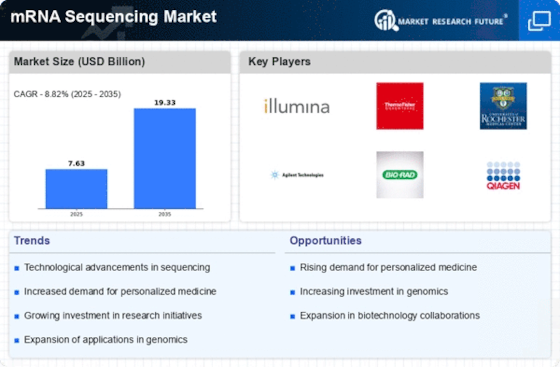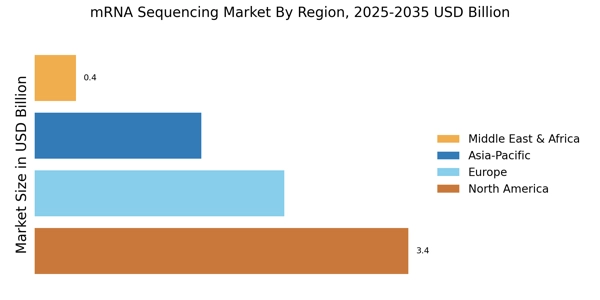Rising Demand for Precision Medicine
The mRNA Sequencing Market is experiencing a notable surge in demand for precision medicine. This trend is driven by the increasing recognition of the need for tailored therapeutic approaches that cater to individual patient profiles. As healthcare systems evolve, the integration of mRNA sequencing technologies into clinical practices is becoming more prevalent. According to recent data, the precision medicine market is projected to reach USD 217 billion by 2028, indicating a compound annual growth rate of approximately 11.5%. This growth is likely to propel the mRNA Sequencing Market, as these technologies provide critical insights into genetic variations and disease mechanisms, thereby enhancing treatment efficacy and patient outcomes.
Growing Investment in Genomic Research
Investment in genomic research is a critical driver for the mRNA Sequencing Market. Governments and private entities are increasingly allocating funds to support research initiatives aimed at understanding genetic diseases and developing novel therapies. For instance, funding for genomic research has seen a substantial increase, with estimates suggesting that public and private investments could exceed USD 10 billion annually by 2026. This influx of capital is expected to foster innovation in mRNA sequencing technologies, leading to improved methodologies and applications. Consequently, the mRNA Sequencing Market stands to gain from enhanced research capabilities and the development of new therapeutic strategies.
Advancements in Sequencing Technologies
Technological innovations are significantly influencing the mRNA Sequencing Market. The advent of next-generation sequencing (NGS) technologies has revolutionized the way mRNA is analyzed, allowing for higher throughput and more accurate results. These advancements facilitate the rapid sequencing of large volumes of mRNA, which is essential for various applications, including drug discovery and biomarker identification. The market for NGS is expected to grow at a CAGR of 20% from 2023 to 2030, reflecting the increasing adoption of these technologies in research and clinical settings. As a result, the mRNA Sequencing Market is likely to benefit from enhanced capabilities and reduced costs associated with sequencing processes.
Increased Adoption in Clinical Diagnostics
The mRNA Sequencing Market is witnessing a rise in the adoption of sequencing technologies in clinical diagnostics. Healthcare providers are increasingly utilizing mRNA sequencing to identify genetic mutations and inform treatment decisions. This trend is particularly evident in oncology, where mRNA sequencing is employed to tailor therapies based on the genetic profile of tumors. The clinical diagnostics market is projected to grow significantly, with estimates indicating a value of USD 60 billion by 2027. This growth is likely to drive demand for mRNA sequencing solutions, as they provide critical information that enhances diagnostic accuracy and treatment personalization.
Emergence of Collaborative Research Networks
Collaborative research networks are emerging as a vital force in the mRNA Sequencing Market. These networks facilitate partnerships between academic institutions, healthcare organizations, and biotechnology companies, fostering the sharing of knowledge and resources. Such collaborations are essential for advancing mRNA sequencing technologies and their applications in various fields, including drug development and disease research. The establishment of these networks is expected to accelerate innovation, as they enable researchers to pool expertise and funding. As a result, the mRNA Sequencing Market is likely to benefit from enhanced research outputs and the rapid translation of findings into clinical practice.

















